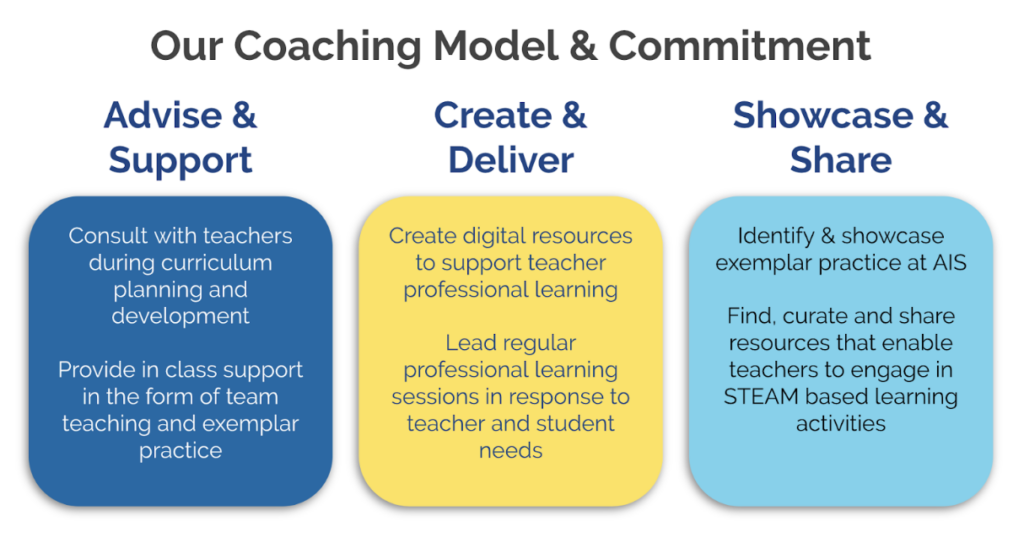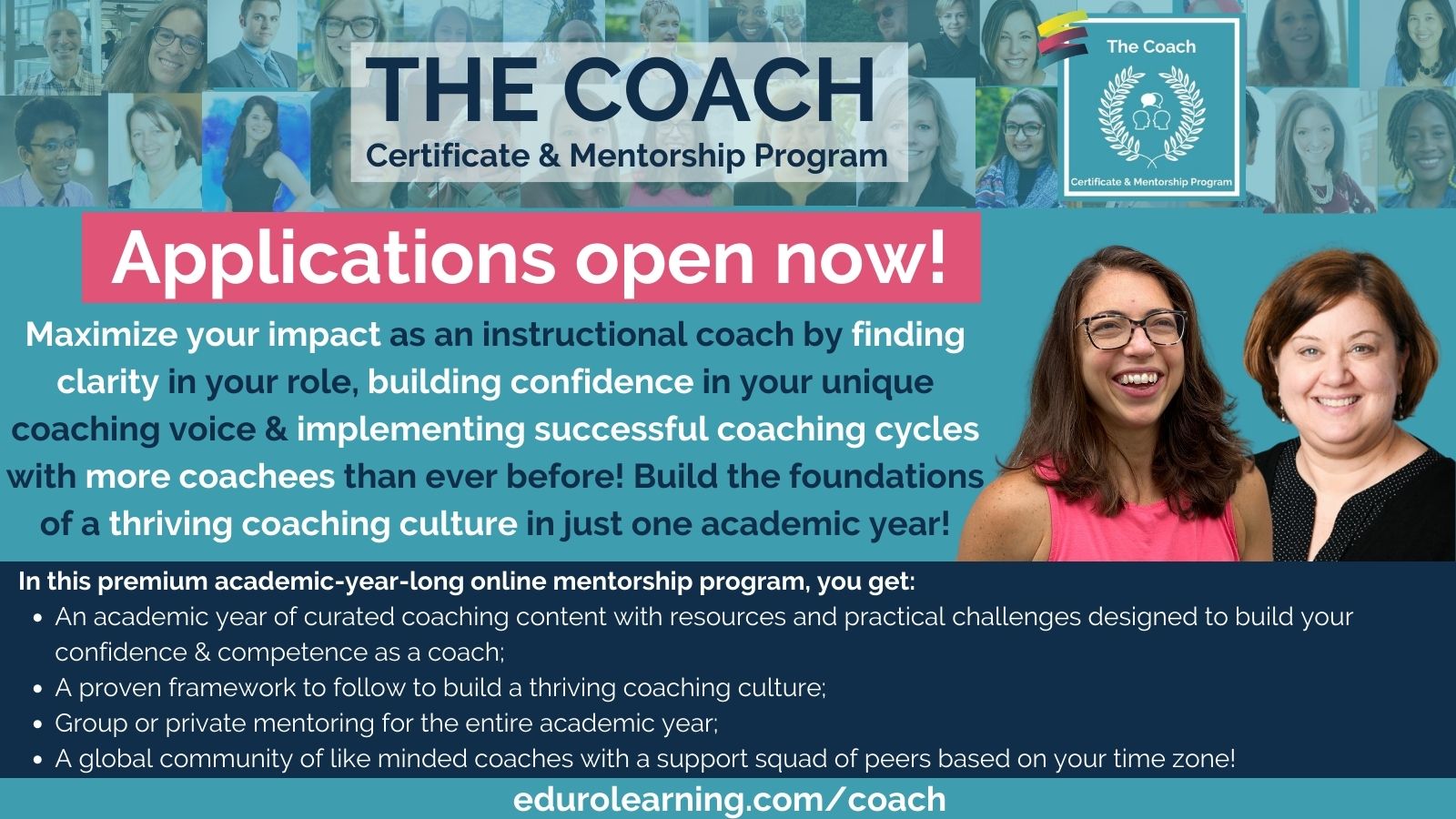Welcome back to another episode of Coach Better! Today we’re chatting with Shaun Kirkwood, Director of Educational Technology at Atlanta International School. This was a comprehensive conversation about how coaches and school leaders can not only build a coaching culture, but also track the impact of the work that coaches do. Shaun shares a wide variety of strategies that all coaches can use to ensure that the value of their role is clear to all stakeholders in the community. Shaun’s focus on building personal relationships through incidental conversations is a great reminder that each action we take helps us build a coaching culture. If you enjoy this episode, make sure to check out our website at coachbetter.tv for more resources to help you #coachbetter!
Subscribe to #coachbetter via your favorite Podcast Player!
Featured Guest

Bonus! Watch the Spotlight Version on YouTube!
Show Notes
Director of EdTech Atlanta International School. From Australia, started working as a civil engineer, changed to education, moved to China, Japan, and then Singapore before Atlanta.
Tell us about the coaching role that you’re in now:
STEAM Team, Director of STEAM, STEAM Coach, 2 EdTech Coaches. Looking at how program is coordinated across the school. Currently trying to align digital citizenship in 1:1 from grade 1 – grade 12. The beauty of coaching is that nothing you do is simple, but you can make it simpler than it appears to be.
The role of coaching: where do the curriculum and teaching skills mesh in with the technology skills they have and how do we prepare children for their career?
Building Rapport in your teaching community, what are your routines (walking the hall, eating lunch in the staff room) “The Coaching Bank” – how do you make connections with colleagues on a professional level, not just a personal one
Coaches need to give people a reason to get on board. What can you offer your colleagues that will make an impact on their professional needs? Showing teachers what is possible. We have an opportunity when we’re coaching, to highlight lesser known functions that can have a high productivity outcome.
Recommended video: Obvious to You, Amazing to Others
Building a Culture of Coaching: Where/How do you start? Being an advocate for the importance of your role
Recognizing where you start and the limitations you have. People don’t understand the role of the coach. One of the things we’ve tried to focus on is creating a model for coaching. Our coaching model and commitment. We’re here to help teachers move forward with their practice as well as help students engage with their learning in different ways.

Can also assign metrics to coaching model to determine success. Provides a framework to refer back to and help teachers and leaders understand the coaching model.
Gets kids working in a different mode, can be done across the school, simple, easy to replicate.
How is the team, and how are the teachers, responding to the model?
Within the team, it’s been good because we’re able to put a name to what we’re doing. Helping us build up our professional identity.
One of the hardest parts of being a coach is managing how people see you. If people see you regularly and they know you’re around, that goes a long way to seeing you as part of the organization. This helps them see that you’re useful to them in some way.
I want three things from our team: we’re professional, we’re organized, and we’re present. A large part of building community is just being present. Taking the time to say hello in the hallway and build up those relationships so that you can drop in to teachers with ideas to try.
What do you do to build relationships?
Just talking to people. Asking people how they’re doing. Sometimes people will say something that is a “simple win” and then helping them with that small issue. Use those opportunities to push in. You might hunt around in 25 conversations and only find 5 opportunities to jump in for a quick win. But they’re worth looking for.
Having these conversations is also important because you can find your allies: people who are tech ready, and very competent teachers who might not have strong tech skills. You have an opportunity to learn from them too.
Having these conversations also helps you learn the culture and history of the school. Getting a handle on the history takes time, but if you just sit in your office and wait for that information to arrive, it’s never going to arrive.
Incidental conversations are one of the most powerful things you can be involved in. It shows you the opportunities you might have to break in, and gives you insight into the history and culture of an organization.
The challenge of being “understood” as a coach – teachers don’t know what you do / think you just have free time
It’s about taking opportunities. When there is an opportunity to take work off someone else’s plate, this goes a long way to helping them understand your value.
Successful coaches find ways to become useful, so that when there is an opportunity to work on a deeper level, teachers and leaders will be more open to working with you.
Be the person who can deliver lessons to kids. If teachers don’t know you’re a good teacher, they will struggle to take your coaching.
What does data look like from coaching? What are you using to help motivate teachers to make improvements/changes? Assessing tech & tech integration, how do you give it value (teacher evaluation, teacher growth): “More Than Ticking the Box”
Used a simple Google Form:
- Which grade level
- Who is the person
- Subject areas
- Coaching, teaching, planning, IT support, creating resources, etc (many choices)
Very handy to see distribution across the school: what parts of the school do I work in the most? What am I doing? Found that the amount of time I was doing tech support was big.
If we weren’t tracking that information, we would have no grounds to have the conversation. Tracking data gives you an opportunity to have a conversation about potentially unexpected, but meaningful, information. Two ways to approach data collection: what do you want to be able to show at the end, there are things you want to show that you couldn’t predict.
If you’re going into a meeting with school leaders, they want to know about research and data. (can be the same with parents). If you’ve done your homework, and you have research and data, it’s hard to undermine you. – John Burns.
Collect anything you can get your hands on – because you don’t know how it will be useful.
You can plan for what you want to collect, particularly when you’re doing student data, but at the same time there are so many incidental pieces of data that pass through the school, it’s worth saving those resources.
Data fluency. One of the key roles of a leader is being able to connect the dots in ways that others might not be able to. – Clint. Being able to take 2 things that may not be connected, and be able to make sense of them.
Don’t hesitate to seek help
Level Up Your Coaching with The Coach!
If you are ready to dive deep into your coaching practice, to help you #coachbetter and build a thriving coaching culture in your school, please join us for our next cohort of The Coach!
Wherever you are in building a coaching culture in your school, The Coach will give you the strategies, skills and tools you need to make coaching a success and will empower you to confidently apply instructional coaching strategies in any situation – from building a coaching program, to having coaching conversations, to being a leader in your school community. We facilitate only one cohort each academic year so we can offer individualized support for each participant.
Coaches of all levels are welcome: you’ll start the program with a self-assessment to determine exactly what the next steps are for you!
Registration for our next global cohort opens once a year – check the website for details!






Recent Comments